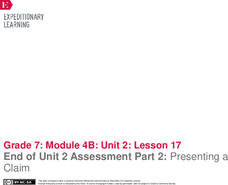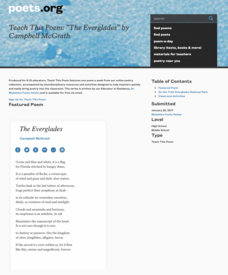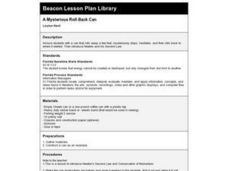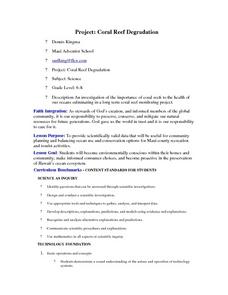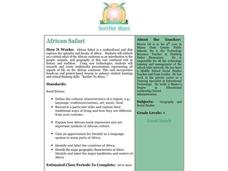EngageNY
Forming a Research-Based Claim: Cascading Consequences Charts
Life is all about choices and consequences. Using a Cascading Consequences chart, scholars create a visual map of the effects of a particular choice or action related to water management. With their researcher's notebooks and copies of...
EngageNY
Forming a Research-Based Claim: Stakeholder Chart on Better Agricultural Water Management
How can industries manage water more sustainably? Building on the previous activity, scholars explore the topic by creating a stakeholder chart for agricultural water management. Next, they participate in the World Café discussion...
EngageNY
End of Unit 2 Assessment, Part 1A: Fishbowl on Better Use of Water in Agriculture
Just keep swimming! Pupils participate in a Fishbowl discussion, sitting in two concentric circles and alternating between speaking and listening roles. During the discussion, they defend a claim about the best way to begin managing...
EngageNY
End of Unit 2 Assessment, Part 1B: Fishbowl on Better Use of Water in Industry
Listen up, it's time for a Fishbowl discussion! Scholars continue their discussions about water management in industry and agriculture. After hearing both sides of the debate, pupils complete graphic organizers, deciding which sector is...
EngageNY
Using Multimedia in Presentations: Presenting Claims
Visuals help clarify claims. Scholars create visual displays to accompany their end-of-unit presentations about water sustainability. Using blank paper and their notes from the unit, they put their creativity to good use and then...
EngageNY
End of Unit 2 Assessment Part 2: Presenting a Claim
There's no time like the present for a presentation. Scholars present their claims about water management using facts, details, and examples from their research throughout the unit. Afterward, they complete exit tickets to evaluate their...
Museum of Science
Egg Bungee
Think bungee jumping looks scary? Knowing the science behind bungee jumping might make it less so. Using an egg and rubber bands, young engineers model bungee jumping. They test the distances that the egg falls for different numbers of...
Academy of American Poets
Teach This Poem: “The Everglades” by Campbell McGrath
Florida's Everglades come alive for young environmental scientists as they watch a video taken in the park and read a poem about the watery paradise. After a careful study of the two resources, class members consider the function of the...
Curated OER
Indigenous Peoples’ Day Lesson Plan
Indigenous Land Guardianship, Settler Colonialism, Racial Capitalism. While the terms may be new to some, they feature in a lesson plan designed for Indigenous Peoples' Day. Young scholars investigate four concepts: Land...
Curated OER
Community Problem Solving
Students use community problem solving to solve a littering problem in the community of San Carlos. Students use a Role Play Description to learn this process.
Curated OER
Determining Momentum and Energy Loss of Balls Colliding Against Different Surfaces
Young scholars experiment with the bounce of balls on various surfaces. In this physics lesson, students use various surfaces to bounce balls to study the momentum. This hands-on activity with the concepts of elasticity of surfaces which...
Curated OER
Florida Springs
Students discover the many uses of water and the sources of the water we see. They complete a worksheet about the water usage at school and at home.
Curated OER
A Mysterious Roll-Back Can
Learners explore Newton and his Second Law by observing a demonstration involving a can that rolls away, then rolls back to where it started. They construct their own Come Back Can and describe how the cans work.
Curated OER
In Your Own Backyard
Students observe organisms in their habitat and record their observations. They then draw conclusions about the organism's habitat needs and food sources.
Curated OER
Erosion Exploration
Ninth graders investigate the factors that increase soil erosion. They identify how the environment is affected by erosion. In small groups, 9th graders research erosion problems in various locations. Groups brainstorm ideas to help...
Curated OER
Coarl Reef Degradation
Students explore methods of preserving Hawaii's ocean ecosystem. Using underwater cameras, students take pictures of the underwater reef. They perform activities to determine the history and degradation of the coal reef. While...
Curated OER
Using the Land
In this land worksheet, students review the different ways that land is used such as landfills, topsoil, farmland, and hazardous waste. This worksheet has 13 true or false questions and 1 short answer question.
Curated OER
India's Endangered Tigers
Learners explore India through maps, as well India's tigers. In this investigating India lesson plan students use the Internet to research the tiger and its environment.
Curated OER
Chemical Composition of American Coins
Students investigate the chemical composition of pennies dated 1983 or later. For this chemical composition of American coins lesson plan, students scratch the surface of the penny to expose the zinc core. They put the penny in...
Curated OER
Air and Water in the Environment
Learners explore the traits of water condensation and evaporation. In this water cycle lesson plan, students develop an awareness of the importance of water for sustaining life. Learners participate in a hands-on activity in which water...
Curated OER
What Influences Reaction Rate?
Students study reaction rates, what determines how fast a reaction happens and how the chemical changes occur. In this reactions instructional activity students complete a lab where they use Alka-Seltzer to observe reaction rate and...
Curated OER
African Safari
Sixth graders gain an appreciation for the different cultures that inhabit the Earth by focusing on the people of Africa
Curated OER
November Science
Students review that all people, plants, and animals live on Earth. They classify objects found in the environment as living or nonliving.
Curated OER
The Politics of Water
Students investigate the Governor's Kansas Water Initiative. Students study rivers, cities and reservoirs and how their location effects the importance of their water quality issues.
Other popular searches
- Liberal vs. Conservatives
- Liberals and Conservatives
- Liberals v. Conservatives
- Political Conservatives
- Conservatives 1980s
- Liberal vs Conservatives
- Liberals v Conservatives
- Liberals, Conservatives
- Liberals Conservatives







